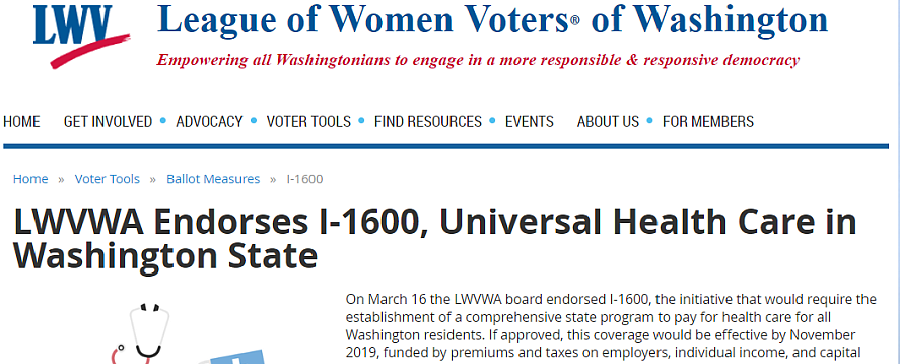Washington State single payer initiative gets 100,000 signatures, but it's not enough to quality for the November ballot

League of Women Voters endorsement of single payer
I-1600, a grass roots single payer health care initiative for Washington State, will not be on the ballot in November. Whole Washington, the sponsor of the initiative, collected more than 100,000 signatures on its petitions, falling short of the almost 260,000 required by state law.
Clearly, it would have been an uphill battle to phase out and replace not only the state’s health insurance exchange, but also Medicare and employer-based insurance, the latter often in place via collective bargaining agreements. The Whole Washington Health Trust, with a board appointed by the governor in conjunction with the insurance commissioner and the legislature, would have been empowered to create and administer the plan. The initiative specified a schedule for the transition from current insurance plans to the new system. With the details of the new system left to a future planning, voters, organizations and legislators were apprehensive about such an abrupt change.
The initiative would have set a maximum premium per person at $200 per month. At the same time, eligibility for financial assistance subsidies for premiums would have been capped at 200% of the poverty level, as opposed to the current 400% under the Affordable Care Act.
During the transition to the new system, Medicare recipients would have been required to pay $200 per month as a premium, in addition to Medicare Part A. These Washington premiums would have been refunded once the new system replaced Medicare. The state would then receive the subscriber’s monthly Medicare Part A and B premiums. Medicare Advantage subscribers with zero premium plans would not have been able to pay these temporary premiums. While national advocates call for Medicare for All, this initiative would have opted the state out of Medicare. This was a confusing proposition for voters.
With premiums capped at $200 per month, the trust would have received the rest of its revenue from a flat 1% income tax, a capital gains tax and an 8.5% payroll tax. The capital gains tax would apply to gains of more than $15,000 in one year, excluding the sale of a home, farm income or retirement accounts. This was the most controversial part of the initiative. Income tax is unconstitutional in the state. Efforts to institute a capital gains tax on gains above $25,000 in one year have failed year after year, blocked by the few voters and interests who expect to have such gains, including affluent voters in suburban swing districts that determine the balance of power in the legislature.
The group hired economist Gerald Friedman, to assess the cost savings of the plan to the state. In addition, proposals from bills introduced in the state legislature were incorporated into the plan. But the organizers of Whole Washington, fiercely dedicated with a strong work ethic for getting things done, did not encompass the spectrum of medical care providers and hospital administrators needed for a broad based consensus. And disagreements caused half of the original board to resign in the course of the 2018 effort.
Unlike some of the other initiative sponsors in Washington State, Whole Washington did not use paid signature gatherers. Without the donations to pay an army of signature gatherers outside supermarkets, it was difficult to gather the requisite number of signatures. Georgia Davenport of Whole Washington assessed the obstacles the organization faced. “The biggest challenge to gathering the amount of signatures we needed to get I-1600 on the ballot was a lack of money for paid signature gatherers, opposition from other single payer groups and individuals who disagreed with our strategy, and an almost complete media blackout even though we sent dozens of press releases and volunteers submitting letters to the editor.”
Subscribers’ private insurance premiums are expected to skyrocket as the mandate and re-insurance that bolstered the Affordable Care Act are destabilized by the Trump administration. The Democrats in the legislature are well aware that the Washington State health insurance exchange may not be able to meet the health care needs of the state. A state-based health care plan could pass in 2019, but for now it won’t be the broad proposal offered as I-1600.

